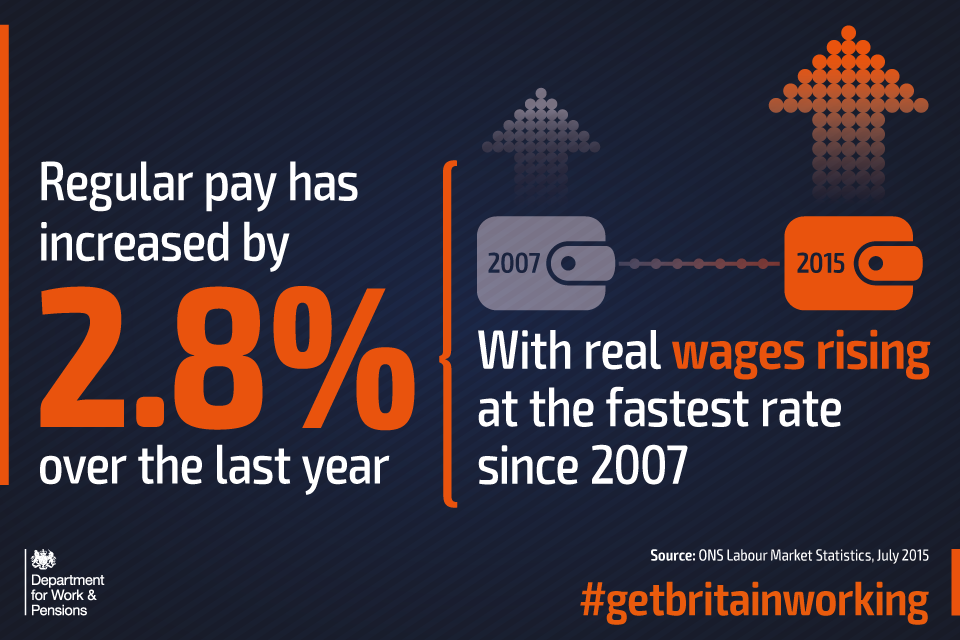Real wages rising at fastest rate since 2007
Figures released today (15 July 2015) show that real wages have grown again – for the eighth consecutive month.

Department for Work and Pensions
Thanks to the government’s long-term economic plan, real wages are currently growing at the fastest rate since 2007. Pay growth (excluding bonuses) has averaged 2.8% over the last year as hardworking people are feeling the benefit of our economic recovery – with more money in their pockets.

Real wages rising at fastest rate since 2007
The strength of the UK labour market continues – with employment rates now well above pre-recession levels, and the female employment rate hitting another record high. Over the past year, the rise in employment has come entirely from full-time work, as the economy continues to grow.
Added to this, the fall in long-term unemployment shows that this one nation government is delivering on the commitment to ensuring the economic recovery is felt by all sections of society.
This news comes as separate figures out today show the number of children living in a household claiming out-of-work benefits is at the lowest level since current records began in 2008 – falling by around 450,000 since 2010.
Employment Minister Priti Patel said:
The strength of the UK labour market is something we should take great pride in. Today’s figures show real wages growing at the fastest rate since 2007, and near record numbers of women in work.
As part of our one nation government, we want everyone to succeed and achieve their full potential.
With the government’s new productivity plan, and introduction of the new living wage, we are ensuring everyone benefits from the economic recovery.
Other key employment statistics today show:
- there are nearly 2 million more people in work than in 2010
- nearly half-a-million more people are in jobs in the private sector in the last year alone
- long-term unemployment has fallen by 184,000 in the last year
- there are 726,000 vacancies, an increase of 68,000 since last year
- the claimant count rate is the lowest it has been since 1975 – at 2.3%
Women
The female employment rate rose to 68.7%, a new record high. Employment rose 19,000 on the quarter and 159,000 on the year.
Young people
Youth unemployment fell by 92,000 over the last year and has fallen by over 200,000 since 2010. This is at the lowest level since 2008.
International
The UK’s employment rate has seen the largest rise of any G7 economy over the last year.
Vacancies
The number of vacancies rose by 68,000 over the past year – bringing them to 726,000, higher than before the recession.
The latest employment statistics come a week after the Chancellor’s Budget unveiled more support for working people:
- a compulsory National Living Wage for people over 25 will be introduced next year and benefit an estimated 2.75 million workers
- the personal tax allowance will also be further increased so that work is rewarded in the tax system – from next year, it will rise to £11,000, taking half a million more people out of paying income tax altogether
- we have announced a plan to tackle the issue of productivity in order to create a more prosperous nation – this will include tackling under-investment in infrastructure and skills, creating a more dynamic work force by reforming planning, cutting unhelpful regulation and ensuring that we have a supportive financial system and tax regime
Support for young people
The Youth Obligation for 18 to 21-year-old Universal Credit will see young people earning or learning, with more intensive support from day one of their claim.
Support for businesses
Increasing the Employment Allowance means that a small business can hire 4 people on £12,500 a year without paying any National Insurance.
More information
Read the Labour Market Statistics – July 2015 from the Office for National Statistics.
Contact Press Office
Media enquiries for this press release – 0203 267 5144
Press Office
Caxton House
Tothill Street
London
SW1H 9NA
Telephone: 0115 965 8781
Follow DWP on:
- Twitter – www.twitter.com/dwppressoffice
- Facebook – www.facebook.com/dwp
- LinkedIn – www.linkedin.com/company/dwp
- YouTube – www.youtube.com/dwp